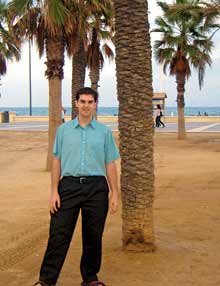Joseph Palaia, SM ‘06–a lifelong enthusiast of space travel–is not about to wait for someone else to plan a manned mission to Mars. He’s long been convinced that NASA’s progress is too slow. “If we are going to do this,” he says, “it has to be a commercial venture.”

So Palaia put himself on the front lines by cofounding 4Frontiers (www.4frontierscorp.com), a space commerce company focused on settling Mars. “We have the technology,” says Palaia, who majored in nuclear engineering and is the company’s vice president of operations. “The only problems standing in our way are political and economic.”
In Palaia’s mind, the mission is like the one early settlers made to America–one way. Given the expense of getting to Mars and the commercial nature of the mission he envisions, it makes little sense to incur the extra expense of a return flight, he says. “It is best to have some limited capability for return, but the intention will be for the majority of the crew to stay and make a new life on Mars.” If all goes well, investors will make their money back in a variety of ways, from property sales to data and media rights.
The first order of business upon arrival would be to extract local resources, Palaia says. The water on Mars is bound in minerals and frozen, so any sustainable settlement would require releasing it by heating the soil enough to break the chemical bonds. Oxygen could then be separated from the water. Additional resources, such as nitrogen and silica, would be released using similar methods. “The location for the initial settlement has been selected to be close to known high concentrations of these critical resources,” he says.
For now, 4Frontiers is working to build a solid client base for its aerospace engineering consulting business. Most recently, a client commissioned the team to create a feasible design for an orbital facility. Although unwilling to give an estimate, Palaia admits that Mars settlement will be a costly venture. But when it happens, he wants to be a part of it.
His wife, Melissa, with whom he lives in Florida, is less thrilled with the idea, but she understands his passion. “Right now we have an aimless society,” Palaia says. “What is lacking is a new frontier.”
Keep Reading
Most Popular
Large language models can do jaw-dropping things. But nobody knows exactly why.
And that's a problem. Figuring it out is one of the biggest scientific puzzles of our time and a crucial step towards controlling more powerful future models.
How scientists traced a mysterious covid case back to six toilets
When wastewater surveillance turns into a hunt for a single infected individual, the ethics get tricky.
The problem with plug-in hybrids? Their drivers.
Plug-in hybrids are often sold as a transition to EVs, but new data from Europe shows we’re still underestimating the emissions they produce.
Google DeepMind’s new generative model makes Super Mario–like games from scratch
Genie learns how to control games by watching hours and hours of video. It could help train next-gen robots too.
Stay connected
Get the latest updates from
MIT Technology Review
Discover special offers, top stories, upcoming events, and more.